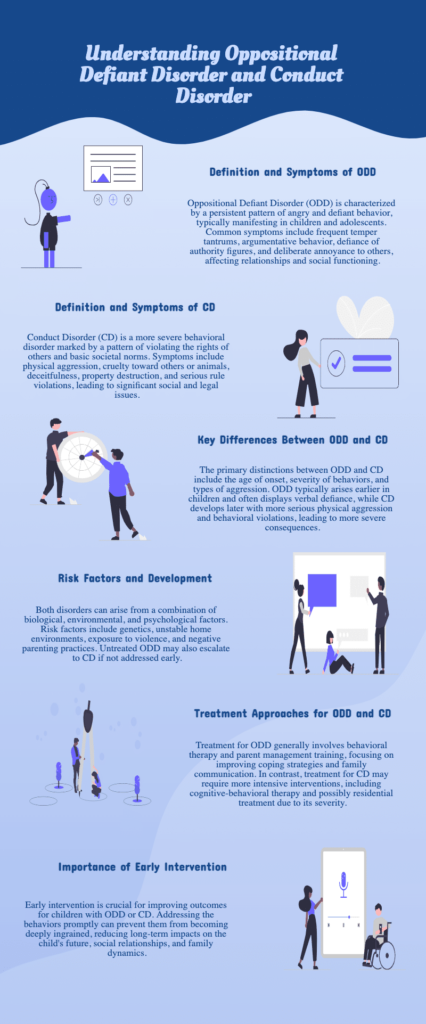Understanding the difference between Oppositional Defiant Disorder (ODD) and Conduct Disorder (CD) is essential, especially for parents, educators, and healthcare professionals dealing with children and adolescents exhibiting disruptive behavior. While these two disorders share some similarities, their distinctions are significant, particularly regarding severity, long-term effects, and treatment approaches. At Southern California Sunrise Recovery Center, we recognize the importance of early intervention and personalized care in addressing both ODD and CD, helping individuals and families navigate the challenges these disorders bring.
What is Oppositional Defiant Disorder (ODD)?
ODD is a behavioral disorder primarily seen in children and adolescents, characterized by a persistent pattern of angry, irritable moods, argumentative behavior, and defiance toward authority figures. Unlike typical teenage rebellion, which is temporary and often situational, children with ODD display these behaviors consistently across different settings, such as at home, school, and with peers.
Common Symptoms of ODD include:
- Frequent temper tantrums or outbursts
- Defying rules or authority figures
- Blaming others for mistakes or misbehavior
- Deliberately annoying or provoking others
- Being easily annoyed or feeling resentful
Children with Oppositional Defiant Disorder (ODD) often struggle to maintain healthy relationships due to their oppositional behavior, which can lead to challenges in school and social environments. The good news is that ODD is typically less severe than Conduct Disorder, and with the right interventions, many children can improve their behavior over time.
What is Conduct Disorder (CD)?
Conduct Disorder is a more severe behavioral disorder that also affects children and adolescents. Individuals with CD exhibit a repetitive and persistent pattern of behavior that violates the rights of others or significant societal norms. This can manifest in aggression toward people or animals, destruction of property, theft, or serious rule violations.
Common Symptoms of CD include:
- Bullying or intimidating others
- Physical aggression or cruelty to people or animals
- Stealing, lying, or deceitfulness
- Vandalism or property destruction
- Serious violations of rules, such as truancy or running away
Children and teens with CD often face significant legal, academic, and social issues. Without proper treatment, Conduct Disorder (CD) can lead to long-term difficulties, including criminal behavior in adulthood. Unlike ODD, the consequences of Conduct Disorder are more severe and can carry long-lasting implications.
Key Differences Between ODD and Conduct Disorder
Though both disorders involve disruptive and defiant behavior, there are essential distinctions between ODD and CD that can affect diagnosis and treatment.
- Age of Onset: ODD typically manifests earlier, with symptoms showing up in preschool years, while Conduct Disorder often develops in later childhood or adolescence.
- Behavioral Differences: Children with ODD tend to engage in argumentative or defiant behavior without significant aggression. Those with CD, on the other hand, display more overtly harmful behaviors, such as aggression toward others or severe rule-breaking.
- Aggression and Emotional Responses: While both disorders can involve anger, aggression in ODD is often verbal, whereas CD can involve physical violence. CD is associated with more severe antisocial behaviors and a lack of empathy toward others.
Similarities Between ODD and Conduct Disorder
ODD and CD share certain risk factors and can co-occur with other mental health conditions such as ADHD, anxiety disorders, or depression. Both disorders can significantly impact a child’s social life, academic performance, and family dynamics.
Risk Factors and Causes of ODD and CD
A combination of biological, environmental, and psychological factors influences the development of ODD and CD. Genetics may play a role, mainly if there is a family history of mental health issues. Environmental factors like exposure to violence, inconsistent parenting, or traumatic experiences can also contribute to these disorders.
Children who experience unstable home environments, including parental substance abuse, neglect, or domestic violence, are at higher risk. Additionally, certain temperamental traits, such as a high need for control or low frustration tolerance, may predispose some children to these disorders.
How ODD Develops into CD
In some cases, untreated ODD can progress into Conduct Disorder. While not all children with ODD will develop CD, early intervention is crucial. Warning signs of this progression include escalating defiance into more aggressive or harmful behavior.
Diagnosing ODD and CD
Mental health professionals use criteria from the DSM-5 (Diagnostic and Statistical Manual of Mental Disorders) to accurately diagnose ODD or CD. A comprehensive evaluation typically involves interviews with the child, parents, and teachers and behavioral assessments. Early detection is essential, as it allows for timely intervention before the behaviors become ingrained or more severe.
Impact on Family and Social Relationships
Children with ODD or CD often experience significant strain in their family relationships. Parents may struggle to manage the child’s defiant behavior, leading to frustration and helplessness. These children may face social isolation or frequent disciplinary actions at school, which can further compound their emotional difficulties.
Treatment Options for ODD
Treatment for ODD focuses on helping the child learn better coping strategies and improving communication within the family. Behavioral therapy is often the first line of treatment, and it can be highly effective in addressing defiance and anger management. Parent management training teaches parents how to respond constructively to their child’s behavior, reinforcing positive behaviors.
Medications are not usually the primary treatment for ODD, but they may be prescribed if the child has co-occurring disorders, such as ADHD or anxiety.
Treatment Options for Conduct Disorder
Given the severity of CD, treatment often involves more intensive interventions. Cognitive-behavioral therapy (CBT) can help the child learn to manage their anger and improve their problem-solving skills. In severe cases, residential treatment or rehabilitation programs, like those offered at Southern California Sunrise Recovery Center, may be necessary.
Medications may be used to address underlying issues such as aggression, depression, or impulsivity, but therapy remains the cornerstone of treatment.
The Importance of Early Intervention
Early intervention is critical in preventing the escalation of ODD into CD or more severe behavioral disorders. Addressing the issue before it becomes deeply ingrained improves outcomes and reduces the long-term impact on the child and family.

The Role of Southern California Sunrise Recovery Center
At Southern California Sunrise Recovery Center, we provide specialized treatment programs designed for children and adolescents struggling with ODD and CD. Our individualized treatment plans are tailored to the unique needs of each child, focusing on therapeutic interventions that promote lasting change.
Get Help Today
Understanding the differences between ODD and CD is the first step in seeking the right help for your child. If you suspect your child may be struggling with either disorder, don’t hesitate to reach out to Southern California Sunrise Recovery Center. Early treatment can change the course of their future, providing hope and healing for the entire family.






